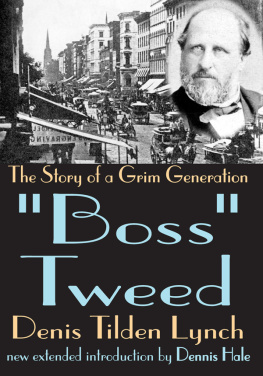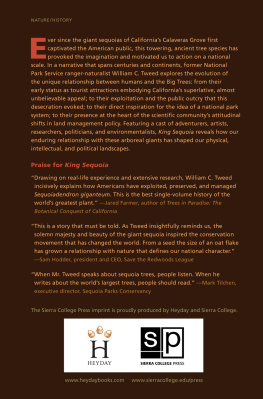Originally published in 1927 by Boni and Liveright
Published 2002 by Transaction Publishers
Published 2017 by Routledge
2 Park Square, Milton Park, Abingdon, Oxon OX14 4RN
711 Third Avenue, New York, NY 10017, USA
Routledge is an imprint of the Taylor & Francis Group, an informa business
New material this edition copyright 2002 by Taylor & Francis.
All rights reserved. No part of this book may be reprinted or reproduced or utilised in any form or by any electronic, mechanical, or other means, now known or hereafter invented, including photocopying and recording, or in any information storage or retrieval system, without permission in writing from the publishers.
Notice:
Product or corporate names may be trademarks or registered trademarks, and are used only for identification and explanation without intent to infringe.
Library of Congress Catalog Number: 2004041264
Library of Congress Cataloging-in-Publication Data
Lynch, Denis Tilden.
Boss Tweed: the story of a grim generation / Denis Tilden Lynch; new extended introduction by Dennis Hale.
p. cm.
Originally published: New York: Boni and Liveright, 1927.
Includes bibliographical references and index.
ISBN 0-7658-0934-6 (pbk.: alk. paper)
1. Tweed, William Marcy, 1823-1878. 2. PoliticiansNew York (State)New YorkBiography. 3. New York (N.Y.)Politics and governmentTo 1898. 4. Tweed Ring. 5. Political corruptionNew York (State)New YorkHistory19th century. I. Title.
F128.47.T96 L96 2002
974.7104092dc21
2001054001
ISBN 13: 978-0-7658-0934-6 (pbk)
No political scandal in American history has had a greater impact on America's political consciousness than the rise and fall of the Tweed Ring in New York City between 1866 and 1871. In an age ripe with scandal both public and private, the spectacular corruption charged to Boss Tweed and his associatesestimates of their extortion range from $20 million to $200 millionbecame an enduring symbol of the dark side of democratic politics. The episode contributed, among other impressions, a classic stereotype of The Boss (thanks to cartoonist Thomas Nast's series in Harper's Weekly) as a darkly menacing, shifty-eyed thug whose jeweled vest cannot disguise his guilty corpulence. But the Tweed Ring contributed much more than cartoonish impressions; it helped to shape a powerful theory of political reform. It was in truth one of the formative events of Progressivism, that multi-faceted doctrine that has evolved into the modern American creed.1 In this sense, the Tweed Ring was to Progressives what Shay's Rebellion was to the Federalists: an event which produced not only deep misgivings about the existing regime, but an insight into how it should be reformed.
Denis Tilden Lynch's biography of Boss Tweed was first published in 1927, in a time filled, like Tweed's, with sudden prosperity, daunting problems, and spectacular scandals. It is a straight-forward, workmanlike study, untroubled by the conceits of modern historical scholarship, and close enough to its subject's generation to have some of the immediacy of journalism.2 Of all the books published about the Tweed affair, Lynch's study is the only one that is a genuine biography, with the man himself as its focus. For this reason, it conveys something of the texture of daily life in New York in the nineteenth century, while bringing Tweed out from behind what Seymour Mandelbaum calls the shadows of Thomas Nast's leering cartoons, and presenting him, as much as is possible, as a man and not an icon.
Lynch was an experienced political observer (he covered the New York state legislature for the










